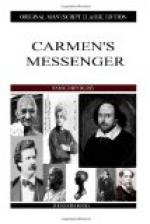It contained a tourist agency’s circular cheque for a moderate sum, payable by coupons at any of the company’s offices in England and Canada, and Foster saw the advantage of this, because, as the offices were numerous, one could not tell where the coupons would be cashed. Then he found a letter, which he thought bore out his conclusions, although, on the surface, it did not tell him much. It stated that Jackson’s business had been satisfactorily transacted in Berlin, but the Hamburg matter had not been arranged yet. Lascelles had had some difficulties in Paris, but expected to negotiate a sale.
Foster carefully folded the papers and replaced them in his pocket. The names were probably false, but they stood for agents of the gang, whose business was, no doubt, the sale of the stolen bonds. He remembered Percival, the treasurer’s, statement that the securities might be disposed of on a Continental bourse, and Hulton’s reluctance to advertise their loss. Well, he now had proof that Daly was, at least, a party to the theft, and ground for believing him to be open to a more serious charge. The fellow was in his power.
He, however, hesitated a moment before opening the letter to Carmen. He was half-afraid of finding her to some extent implicated in the plot; and it was with relief he saw nothing but another envelope inside the first, which he threw into the fire. The enclosed envelope was addressed to a man he did not know, and he thought Carmen’s part would be confined to giving it to her father, or somebody else, who would pass it on. Tearing it open, he found a cheque on an American bank for a thousand dollars, but the payee’s name was different from that on the cover. Foster put it away and lighted his pipe.
Some of the bonds had obviously been sold and there were a number of men in the plot, though it was possible that they did not know all about the Hulton tragedy. Foster understood that one could dispose of stolen securities through people who would undertake the dangerous business without asking awkward questions, if the profit were high enough. Still he thought Graham knew, and this would give him an incentive stronger than his wish to save the money for trying to get the letters back. Indeed, Foster imagined that he was now in serious danger. Graham’s run to the telephone had alarmed him.
Nobody came in and by degrees the room across the passage got quiet as its occupants went away. It was some relief that the noise had stopped, but Foster liked to feel that there were people about. He was tired and began to get drowsy as he lounged in front of the fire, but roused himself with an effort, knowing he ought to keep awake. For all that, he did not hear the door open, and got up with a start as a man came in. Then his alarm vanished for Pete stood looking at him with a sympathetic twinkle.
“I ken what ye feel,” the latter remarked. “It’s like meeting a keeper when ye hae a hare in the lining o’ yere coat.”




